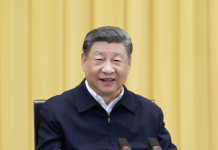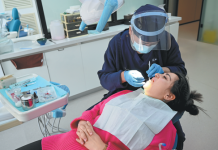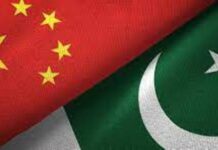China announced on Sunday it will send its next spaceflight crew to the Tiangong space station in June following the successful return of the three astronauts of the Shenzhou XIII mission on Saturday.
The Shenzhou XIV crew will consist of three astronauts and they will take off from the Jiuquan Satellite Launch Center in northwestern China in June to Tiangong and work there for six months, Hao Chun, head of the China Manned Space Agency, said at a news briefing held by the State Council Information Office.
Before the manned mission, the Tianzhou 4 robotic cargo spaceship will lift off in May to transport supplies, experimental materials and fuel to the Tiangong station.
In July, the space station’s first lab component-Wentian, or Quest for the Heavens-will be launched while the second lab named Mengtian, or Dreaming of the Heavens, will be sent to dock with the station in October, according to Hao.
Once they are connected with the Tiangong, the station will become complete with a T-shaped structure, he said. After the space labs, the Tianzhou 5 cargo craft and the Shenzhou XV crew are scheduled to arrive at the massive orbiting outpost, the largest space-based infrastructure the nation has ever built, he said.
After the Tiangong’s completion around the end of this year, it will have three pillar sections-a core module linked with two large space labs, weighing around 70 tons. In the long term, the station will regularly be connected with a Shenzhou spacecraft and two Tianzhou cargo ships, the China Manned Space Agency said.
By now, Tianzhou 4 and its carrier-a Long March 7 rocket-have arrived in the Wenchang Space Launch Center in Hainan province and are undergoing final tests, the agency said last week.
Huang Weifen, the chief trainer of Chinese astronauts, said at the news conference the Shenzhou XIV and XV crew teams are in “very good condition” and have had extensive training and preparations.
Both will stay in space for six months and conduct spacewalks. During the mission shift lasting up to 10 days, all of the six astronauts will be inside the Tiangong station and work together, she said.
“The Shenzhou XIV astronauts will cooperate with ground controllers to perform the in-orbit assembly of Tiangong, making it a three-component spacecraft stack,” Huang said.
Speaking about future plans, Hao said China intends to launch a large space telescope named Xuntian, or Surveying the Sky, next year to fly alongside the Tiangong station.
Furthermore, Chinese researchers are developing a new carrier rocket and a new spacecraft. Both will be used to transport astronauts.
“The new-generation manned spacecraft will be much better (than the Shenzhou series) in terms of overall capability. It will be capable of carrying seven astronauts and more cargoes,” he said. -The Daily Mail-China Daily News Exchange Item





